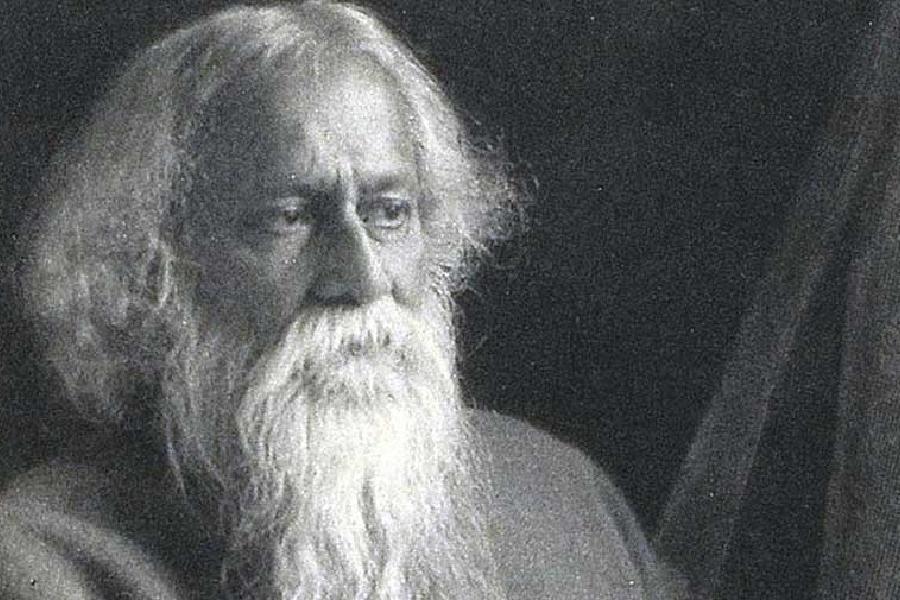Tagore’s poems, fiction, non-fiction, songs, dance-drama, philosophy and paintings continue to inspire millions not only within Bengal but throughout the country and the entire world.
Today, we celebrate the 163rd birth anniversary of Kabiguru Rabindranath Tagore. Born on May 7, 1861, or Ponchishe Baisakh (Baisakh 25) to Maharshi Debendranath Tagore and Sarada Devi in the historic Jorasanko mansion in Calcutta, Tagore was the youngest of the 13 surviving children.
His father, the illustrious Maharshi Debendranath Tagore — a prominent philosopher and religious reformer — had shaped the life and thoughts of contemporary Bengal in many ways. Rabindranath’s elder brother Satyendranath Tagore was the first Indian to join the ICS or the Indian Civil Service.
Interestingly, all 12 brothers and sisters of Kabiguru have left their mark on multiple socio-cultural and political fields of Bengal and India.
As undisputedly India’s most famous educational, cultural and social icon, Kabiguru has never been more relevant as in the present world. When we celebrate his birthday, we pay our homage to a polymath who was a versatile mastermind excelling as a poet, writer, playwright, composer, philosopher, social reformer and painter during the Bengal Renaissance.
As a true pioneer, Kabiguru reshaped Bengali literature, music as well as Indian art with Contextual Modernism in the late 19th and early 20th centuries.
As an educator, Tagore’s tireless efforts for education and other ideas fructified in Santiniketan (The Abode of Peace), Bolpur. His philosophy of education was based on four fundamental principles: individualism, naturalism, spiritualism and internationalism. For Tagore the educator, students need to develop their talent and potential through creative expression — thus developing the entire personality — physical, emotional, and intellectual capabilities. His pragmatic vision of
education is revealed in his establishment of Sriniketan to teach agriculture and indigenous craft at Surul, about 3km from Santiniketan.
Tagore realised that education was not merely passing examinations and acquiring degrees. Education should be a process of self-discovery and development of spiritual and moral aspects of one’s personality. Education
needs to inculcate in an individual love for humanity, international understanding, universal brotherhood and freedom. Tagore believed that true knowledge is that which perceives the unity of all things in God. Through his vast, immortal literary works, he has taught us that the universe is a divine manifestation and the ways to bridge the gulf and reach him.
Tagore’s pedagogical prescription avoided rigorous classroom schooling. This was an outcome of his own experience at various schools in Calcutta. In search of an ideal learning space, he kept changing schools. The long list included Calcutta Academy, Oriental Seminary, and finally St Xavier’s, his last school where he studied for a brief period. Later, he was to be one of the founder vice-presidents, along with Acharya J.C. Bose, of the Alumni Association of St Xavier’s in 1927.
As a tribute to Gurudev, on his 150th birth anniversary, the department of Bangla at St Xavier’s College introduced the three-year Bangla honours course from the session 2012-2013. The department has a rich past even though it offered only general and ancillary courses and a vibrantly active literary society.
Although Gurudev studied briefly at St Xavier’s, it left a lasting impression on his mind. Years later, in his memoir Jiban Smriti, he recounted his experience. One day, in the absence of the regular teacher Fr Henry, an expert in Bengali, Fr De Peneranda was taking their class and had given some class work. Tagore was not interested and was drawing doodles on his copy. Fr Peneranda came up to him, touched him on the back very affectionately and asked: “Tagore, are you not well”?
“Not many words,” writes Tagore, “but even now when I remember that, I feel the presence of God”.
Let us take to heart these ideas and experiences of Tagore and learn from his philosophy of education, inculcating love for humanity, international understanding, universal brotherhood and quest for freedom in our lives. Going back to his experience with Fr De Peneranda, let us also make our life something beautiful.
Tagore taught us to love and sacrifice for our motherland, and to pray for her and countrymen. Let us pray with him in his immortal words: “Where the mind is without fear and the head is held high, into that heaven of freedom my Father, let my country awake.”











